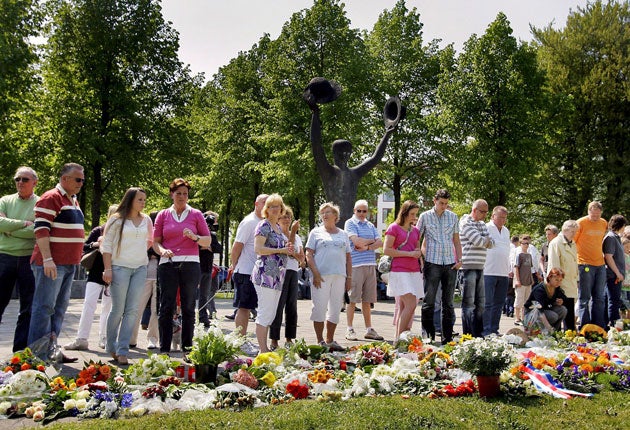Mystery of 'nice fellow' who killed 6 at royal parade
Shocked country mourns end of relaxed security for royals and politicians

Your support helps us to tell the story
From reproductive rights to climate change to Big Tech, The Independent is on the ground when the story is developing. Whether it's investigating the financials of Elon Musk's pro-Trump PAC or producing our latest documentary, 'The A Word', which shines a light on the American women fighting for reproductive rights, we know how important it is to parse out the facts from the messaging.
At such a critical moment in US history, we need reporters on the ground. Your donation allows us to keep sending journalists to speak to both sides of the story.
The Independent is trusted by Americans across the entire political spectrum. And unlike many other quality news outlets, we choose not to lock Americans out of our reporting and analysis with paywalls. We believe quality journalism should be available to everyone, paid for by those who can afford it.
Your support makes all the difference.The motives of a "nice, quiet fellow" who killed six people while attempting to ram a bus carrying the Dutch queen may never be known, investigators said yesterday.
Karst Tates, 38, an unemployed security guard, died of his injuries in hospital in the early hours of yesterday. Before losing consciousness in the wreckage of his black Suzuki Swift, he told a police officer that he intended to harm Queen Beatrix and other members of the Dutch royal family as they drove through the crowded streets of Apeldoorn in an open-topped bus.
The attack was mourned by the Dutch press yesterday as the "end of a national illusion" that the Netherlands could maintain its relaxed style of life and politics in a dangerous modern world.
Tates had just lost his job and apartment but had no previous record of violence or mental illness and had no known political connections.
He had been due to move out of his flat yesterday. His former landlord in the small town of Velp, near Arnhem, where he lived before moving to Huissen in 2007, described him as a "nice quiet fellow".
Neighbours said he was an inoffensive loner who liked to roar around the streets in his souped-up Suzuki. Police said that a search of his apartment had found no explosives or weapons.
Tates accelerated his car through police barriers and spectators in an attempt to reach the royal bus on Thursday, the Queen's Day national holiday in the Netherlands.
Four men and two women were killed, four immediately and two later in hospital. Ten other people were injured, including three children aged nine, 15 and 16.
Musicians in a Dutch West Indian military band were among those hurt. One of the victims was named as Rolf Nijenhuis, 55, a military policeman who had driven the band to the parade route.
Investigators believe that Tates was so badly injured in the collision with spectators that he was unable to ram the royal bus as he intended.
Instead his battered car drifted out of control, passing five metres from the shocked royal party and colliding with a stone monument.
A map of the queen's intended route, possibly copied from a newspaper, was found in his car.
"It is very difficult now that we no longer have the suspect to reconstruct what was behind this," Fred de Graaf, the Mayor of Apeldoorn, said yesterday. "An element of uncertainty will remain because you can no longer question the suspect ... the last piece of the puzzle will remain in question."
The unexplained attack on the popular Dutch royal family has sent shockwaves through a country which prizes its tolerant and relaxed way of life. Dutch royals have traditionally been open to frequent and easy contact with their subjects.
The royal palace insisted that the queen's engagements next Monday for Memorial Day, commemorating the Second World War, would go ahead. But yesterday not everyone was sure that normality would return so easily.
"A national illusion died in Apeldoorn," said the Volkskrant newspaper. "We will never see it like this again, a queen and her family, free and approachable ... The collection of curiosities in the category 'only in the Netherlands' is one attraction poorer. Foreigners who are surprised by ministers who cycle to their offices, a prime minister eating a herring alone at the fish stall next to parliament – it is all gone."
Join our commenting forum
Join thought-provoking conversations, follow other Independent readers and see their replies
Comments